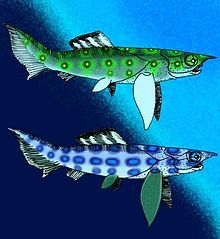Camuropiscis
Appearance
(Redirected from Camuropiscis laidlawi)
| Camuropiscis Temporal range: Late Devonian: Frasnian,
| |
|---|---|

| |
| Reconstruction of Camuropiscis laidlawi (top), and C. concinnus, from the Gogo Reef of Late Devonian Australia | |
| Scientific classification | |
| Domain: | Eukaryota |
| Kingdom: | Animalia |
| Phylum: | Chordata |
| Class: | †Placodermi |
| Order: | †Arthrodira |
| Suborder: | †Brachythoraci |
| Family: | †Camuropiscidae |
| Genus: | †Camuropiscis Dennis & Miles, 1979 |
| Species | |
| |
Camuropiscis is an extinct genus of arthrodire placoderm from the Early Frasnian stage of the Late Devonian period, found at the Gogo Formation of Kimberley, Western Australia. The species of Camuropiscis had a flattened, elongated snout that may have aided in enhancing its hydrodynamic streamlining.
Etymology
[edit]Camuropiscis translates as "flat-nosed fish."[1]
Phylogeny
[edit]Camuropiscis is a member of the family Camuropiscidae under the superfamily Incisoscutoidea, which belongs to the clade Coccosteomorphi, one of the two major clades within Eubrachythoraci.[2][3] The cladogram below shows the phylogeny of Camuropiscis:[3]
References
[edit]- ^ Dennis Kim; R. S. Miles (September 1979). "A second eubrachythoracid arthrodire from Gogo, Western Australia". Zoological Journal of the Linnean Society. 67: 1–29. doi:10.1111/j.1096-3642.1979.tb01102.x.
- ^ You-An Zhu; Min Zhu (2013). "A redescription of Kiangyousteus yohii (Arthrodira: Eubrachythoraci) from the Middle Devonian of China, with remarks on the systematics of the Eubrachythoraci". Zoological Journal of the Linnean Society. 169 (4): 798–819. doi:10.1111/zoj12089.
- ^ a b Zhu, You-An; Zhu, Min; Wang, Jun-Qing (1 April 2016). "Redescription of Yinostius major (Arthrodira: Heterostiidae) from the Lower Devonian of China, and the interrelationships of Brachythoraci". Zoological Journal of the Linnean Society. 176 (4): 806–834. doi:10.1111/zoj.12356. ISSN 0024-4082.








